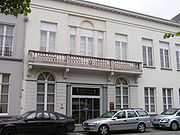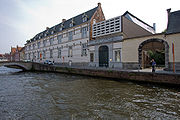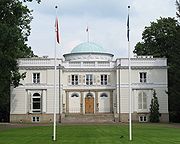- College of Europe
-
College of Europe Collège d'Europe 
Established 1949 Type Postgraduate institute Rector Prof. Paul Demaret Academic staff 140 Students 420 postgraduates from over 50 countries Location Bruges, Belgium and Natolin (Warsaw), Poland Campus Residential Working languages English and French Website coleurope.eu The College of Europe (Collège d'Europe in French) is an independent university institute of postgraduate European studies with the main campus in Bruges, Belgium. Since 1993 the college has also had an additional campus in Natolin, Poland focusing on Eastern Europe.
The College of Europe in Belgium was founded in 1949 by leading European figures such as Salvador de Madariaga, Winston Churchill, Paul-Henri Spaak and Alcide de Gasperi in the wake of the Hague Congress in 1948. The goal of the College was described as promoting "a spirit of solidarity and mutual understanding between all the nations of Western Europe and to provide elite training to individuals who will uphold these values"[1] and "to train an elite of young executives for Europe".[2] It has the status of "Institution of Public Interest" operating according to Belgian Law.
According to The Times, the "College of Europe, in the medieval Belgian city of Bruges, is to the European political elite what the Harvard Business School is to American corporate life. It is a hothouse where the ambitious and talented go to make contacts".[3] The Economist describes it as "an elite finishing school for aspiring Eurocrats."[4] The Financial Times writes that "the elite College of Europe in Bruges" is "an institution geared to producing crop after crop of graduates with a lifelong enthusiasm for EU integration."[5] European Commissioner for Education Ján Figeľ described the college as "one of the most emblematic centres of European studies in the European Union".[6] The college has also been described as "the leading place to study European affairs"[7] and as "the elite training center for the European Union's political class".[8] RFE/RL has referred to the college as "a Euro-federalist hot-spot."[9] The College of Europe is bilingual, and students must be proficient in English and French. Students receive a master's degree (formerly called Diploma and Certificat) following a one-year programme. Traditionally, students specialize in either European law, international economics (i.e. European economic studies), or European political and administrative studies; in recent years, additional programmes have been created. Admission is highly competitive. The number of students each year used to be quite low (less than 100 until the early 1970s and typically slightly above 100 until the mid 1980s), but has increased since the early 1990s. Students are usually selected in cooperation with their countries' ministries of foreign affairs.
The College of Europe in Belgium shares several traditions with, and is often compared to, the École nationale d'administration (ENA) of France,[10] but has a vastly more international profile.
History
The College of Europe was the world’s first university institute of postgraduate studies and training in European affairs. It was founded in 1949 by leading European figures such as Salvador de Madariaga, Winston Churchill, Paul-Henri Spaak and Alcide de Gasperi in the wake of the Hague Congress in 1948.
Its origins date back to the Hague Congress in 1948 when Salvador de Madariaga, a Spanish statesman, thinker and writer in exile, proposed the establishment of a College where university graduates from many different countries could study and live together.
A group of Bruges citizens led by the Reverend Karel Verleye succeeded in attracting the College to Bruges. Professor Hendrik Brugmans, one of the intellectual leaders of the European Movement of the time, became its first Rector (1950-1972).
After the fall of communism, and in the wake of the changes in Central and Eastern Europe, the College of Europe campus at Natolin (Warsaw, Poland), was founded in 1993 with the support of the European Commission and the Polish government. The College now operates as ‘one College - two campuses’ and what was once referred to as the ‘esprit de Bruges’, is now known as the ‘esprit du Collège’.
In 1998, former students of the College set up the Madariaga European Foundation.
The number of enrolled students has increased significantly since the 1990s.
Admissions
Admission to the College of Europe is highly competitive, and was even more so before the 1990s. Application may be made to national selection committees or by direct application to the College of Europe for individuals from a country where no selection committee exists.[11] There are currently 28 national selection committees.[12]
Campuses
Bruges campus
The Bruges campus is situated in the centre of Bruges, which was appointed European Capital of Culture in 2002. Bruges is located in the Flemish Region of Belgium, a Flemish (Dutch)-speaking area, although the university does not use Dutch as one of its working languages.
It consists of the following campus buildings:
- Dijver
The College's main administrative building on the Bruges Campus, with the reception, offices, classrooms and the library.
- Verversdijk
Since 2007 the Verversdijk buildings of the College of Europe provide additional auditoria, teaching rooms and offices for academics, research fellows and staff and will allow the College to extend its activities.
- Garenmarkt
The Hotel Portinari in Garenmarkt 15 with its classical facade was formerly home to Tommaso Portinari, the administrator of the Florentine "Loggia de Medici" in the 15th century in Bruges. It contains eleven apartments for professors and forty student rooms, two "salons" in 19th century style, the "salon du Recteur" with 18th century wall paintings and a modern "Mensa" for students.
- Residences
The College has a system of residences in the centre of Bruges and not far from the Dijver where the main administrative and academic building and the library are situated. None of the residences lodges more than 60 students so that each residence in fact has its own small multinational and multicultural environment.
Natolin (Warsaw) campus
The Natolin Warsaw campus of the College was established in 1992 in response to the revolutions of 1989 and in anticipation of the European Union’s eastern enlargement.
Today, the Natolin campus is part of a 120-hectare historical park and nature reserve - formerly the Royal hunting palace of Natolin - situated in the southern part of Warsaw about 30 minutes by metro from the city centre. The Natolin European Centre Foundation takes care of the complex and has conducted restoration of the former Potocki palace, making it available for the College.
The old historical buildings, including the Manor house, the Stables and the Coach house, were converted to the needs of modern times and new buildings were constructed in a style keeping with the harmony of the Palace and its outlying park.
Academic programmes
The one year programme lasts from September until the end of June and is taught in English and French. It includes lectures, research seminars, workshops and meetings with external specialists and various language courses. To be awarded the degree, students must take oral and written examinations at the end of each semester, and submit a 15 ECTS Master’s Thesis in English or French. The thesis gives students the opportunity to undertake individual research, conducted primarily in the second semester, under the supervision of a faculty member. The programmes are enriched by study trips to the European institutions and, for students at Natolin (Warsaw), also to neighbouring countries. Due to the College’s extensive network of contacts, students have the opportunity to meet and discuss with policy-makers, practitioners and representatives of the business community throughout their year at the College.
From 1949 to the 1990s, students in Bruges enrolled in three programmes:
- European Economic Studies (i.e. studies of international economics with an emphasis on the EU);
- European Legal Studies (i.e. studies of European law);
- European Political and Administrative Studies (i.e. studies of political science and public administration focusing on the EU)
In recent years, other programmes have been created:
- European International Relations and Diplomacy Studies.
At Natolin (Warsaw) campus, the study programme analyses the process of European integration with a focus on Eastern Europe from an interdisciplinary perspective:
- European Interdisciplinary Studies: the internal and external dimensions of the European Union.
The academic programmes of the College of Europe are accredited by the Dutch-Flemish Accreditation Organisation (NVAO). Each study programme corresponds to a total of 66 credits (ECTS).
Annual intakes are highly selective and student selection takes place in the Spring, usually in association with the Foreign affairs ministries of their respective countries of origin. The Bruges programmes typically require a University degree in economics, law, political science or international relations plus advanced knowledge of the working languages of the College.
Degrees awarded
- Master in European Law (LLM)
- Master of Arts in European Economic Studies
- Master of Arts in European Political and Administrative Studies
- Master of Arts in EU International Relations and Diplomacy Studies
- Master of Arts in European Interdisciplinary Studies
To be awarded the current Master's degree, students must take oral and written examinations at the end of each semester, and submit a 15 ECTS (i.e. the equivalent of a quarter of an academic year) Master's Thesis in English or French.
Until the 1980s, the College only awarded its students the qualification Certificate of Advanced European Studies (the programme also then included several shorter theses), that was considered equivalent to a master's degree (although it was not a degree in the strictest sense, as the College of Europe was inspired by the tradition of French elite schools such as ENA which did not award formal degrees). The qualification, with specialization in either (European) Law, (international) Economics, or Political and Administrative Studies, corresponded to the first three master's degrees that are awarded today.
The College introduced a voluntary Diploma in the late 1980s and the Master's degree in the early 1990s. Initially the Master's degree was awarded as an autonomous, additional degree to students having obtained a high average mark (above 15/20) in their "Certificate" or "Diploma" and successfully completing a Master's thesis in the year following graduation. In the mid-1990s, the College of Europe decided to require all students to write a short Master's thesis as a requirement of its 1-year programme, and the Master's degree became the only degree issued. The old Certificate of Advanced European Studies and the newer Master's degrees are considered equivalent.
Governing bodies
- Administrative Council
The Administrative Council, presided by Mr Íñigo Méndez de Vigo, Member of the European Parliament, includes representatives of the countries hosting the two campuses in Bruges (Belgium) and Natolin (Warsaw) and of European governments. It is the highest decision-making authority, and is responsible for the approval and implementation of the College’s objectives and activities of the College on the Rector's proposal.
- The Executive Committee
The Executive Committee exerts the delegations which were entrusted to him by the Administrative Council. Reporting to the Administrative Council, the it ensures the sound financial and administrative management of the College. The Rector & Vice-Rector Rector Paul Demaret directs and coordinates the College’s activities, and is assisted by the Vice-Rector, Ewa Ośniecka-Tamecka, who is responsible for the day-today administration of the campus in Natolin (Warsaw).
- The Academic Council
The Academic Council represents the academic community of the College of Europe and ensures the maintenance and development of high level teaching activities and research. It is chaired by the Rector.
Rectors of the College of Europe
The Rector directs and coordinates the College’s activities.
- Hendrik Brugmans (1906-1997) (1949-1971)
- Jerzy Łukaszewski (°1924) (1972-1990)
- Werner Ungerer (°1927) (1990-1993)
- Gabriel Fragnière (°1934) (1993-1995)
- Otto von der Gablentz (1930-2007) (1996-2001)
- Piet Akkermans (1942-2002) (2001-2002)
- Robert Picht (1937-2008) (a.i. 2002-2003)
- Paul Demaret (2003 - present)
Vice Rectors (Natolin (Warsaw) campus)
The Vice-Rector is responsible for the day-today administration of the Natolin (Warsaw) campus.
- Ettore Deodato (1993)
- David W. Lewis (1994-1996)
- Jacek Saryusz-Wolski (1996-1999)
- Piotr Nowina-Konopka (1999-2004)
- Robert Picht (Vice-Rector ad interim) (2004-2005)
- Robert Picht (2005-2007)
- Ewa Ośniecka-Tamecka (2007- present)
Presidents of the Administrative Council of the College of Europe
- Salvador de Madariaga (1950-1964)
- Jean Rey (1964-1974)
- François-Xavier Ortoli (1974-1975)
- Daniel Coens (1985-1990)
- Manuel Marin (1990-1995)
- Jacques Delors (1995-2000)
- Jean-Luc Dehaene (2000-2009)
- Iñigo Méndez de Vigo (2009 - present)
Alumni
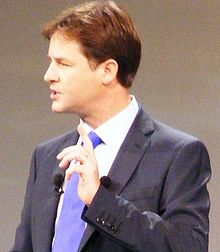 Nick Clegg (Mozart Promotion)
Nick Clegg (Mozart Promotion)
 Alexander Stubb, Minister for Foreign Affairs (Finland) and politician of the National Coalition Party (European People's Party)
Alexander Stubb, Minister for Foreign Affairs (Finland) and politician of the National Coalition Party (European People's Party)
 Helle Thorning-Schmidt (Charles IV Promotion)
Helle Thorning-Schmidt (Charles IV Promotion) Valerie Plame (Scholl Promotion)
Valerie Plame (Scholl Promotion)
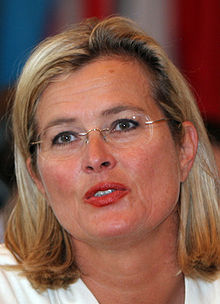 Ursula Plassnik, former Foreign Minister of Austria
Ursula Plassnik, former Foreign Minister of Austria
 Manuel Marín, President of the European Commission
Manuel Marín, President of the European Commission
Many former students of the College, referred to as anciens (French for alumni), have gone on to serve as government ministers, members of various parliaments, diplomats and high ranking civil servants and executives.
Alumni of note include:
- Louise Fréchette, Deputy Secretary-General of the United Nations
- Manuel Marín, former President of the European Commission
- Nick Clegg, British politician, Deputy Prime Minister of the United Kingdom and leader of the Liberal Democrats, former member of the European Parliament
- Helle Thorning-Schmidt, Prime Minister of Denmark and leader of the Social Democrats (Denmark)
- Ursula Plassnik, Foreign Minister of Austria, a member of Austrian People's Party (European People's Party)
- Alexander Stubb, Finnish Minister for Foreign Affairs, a member of politician of the National Coalition Party (European People's Party)
- Nigel Forman, British MP and Minister of Higher Education (1992), a member of the Conservative Party
- Adrien Zeller, former French minister in the second Jacques Chirac government (1986-1988), former President of Alsace Regional Council, a member of the Union for a Popular Movement
- Jon Ola Norbom, former Minister of Finance of Norway
- Nikola Poposki, Macedonian Minister for Foreign Affairs and former Ambassador of the Permanent Mission of the Republic of Macedonia to the European Union
- Jim Oberstar, member of the United States House of Representatives
- Valerie Plame, former United States CIA Operations Officer
- Francesco Paolo Fulci, former Permanent Representative of Italy to the United Nations (1993–1999), currently serving as President of "Ferrero International" Group
- Luc Coene, Belgian economist and Governor of the National Bank of Belgium (NBB)
- Josef Joffe, German editor and publisher of Die Zeit and adjunct professor of political science at Stanford University
- David McWilliams, Irish economist, journalist and documentary-maker
- György Schöpflin, a Hungarian academic and politician, Member of the European Parliament for Fidesz and the European People's Party
- Andrew Tyrie, Member of Parliament (MP) for Chichester and Chairman of the Treasury Select Committee, a member of Conservative Party
- Jo Leinen, German member of the European Parliament, former president of the Union of European Federalists
- Alyn Smith, Scottish member of the European Parliament
- Jacek Saryusz-Wolski, Polish member of the European Parliament
- Xavier Prats Monné, EU official
- Simon Hughes, British politician and Liberal Democrat Member of Parliament
- Juan Moscoso, Spanish socialist Member of Parliament, spokesman in the European Union Committee and is a member of the Foreign Affairs Committee, the Development Committee and the Inter-Parliamentary Union.
- Chris Hoornaert, Permanent Representative of Belgium to the OECD
- Sylvie Lucas, Luxembourg's ambassador to the United Nations and president of the United Nations Economic and Social Council (ECOSOC) (2009-2010)
- Poul Skytte Christoffersen, Danish Permanent Representative to the European Institutions, Special advisor to The Right Honourable Catherine Ashton,Baroness Ashton of Upholland, the High Representative of the Union for Foreign Affairs and Security Policy
- Niels Egelund, Danish diplomat, former Ambassador to France
- Iwo Byczewski, former Polish Ambassador to Belgium and Luxembourg
- David O'Sullivan (civil servant), Director General for Trade of the European Commission
- Stephen Kinnock, Director World Economic Forum Head of Europe and Central Asia
- Ledi Bianku, judge at the European Court of Human Rights
- Jonathan Faull, Director General, Directorate-General Internal Market and Services (DG MARKT), European Commission
- Árni Páll Árnason Icelandic Minister of Economic Affairs. Promotion Mozart.
- Mary O'Rourke, barrister
- Thomas Mayr-Harting, Austrian diplomat
- Enzo Moavero Milanesi, ministre des affaires européennes (gouvernement Monti)
Promotions
Academic years at the College are known as promotions. Each promotion is named after an outstanding European, referred to as the promotion's patron. The College of Europe shares this tradition with the French École nationale d'administration (ENA).
The opening ceremony each year is presided over by a prominent politician, referred to as the Orateur; they have included Angela Merkel, David Miliband, Jean-Claude Juncker, Javier Solana, José Manuel Barroso, Valéry Giscard d'Estaing, Juan Carlos I of Spain, Margaret Thatcher and François Mitterrand.[13]
Professors taught at College of Europe
- Dominique Moïsi, co-founder and is a senior advisor of the Paris-based Institut Français des Relations Internationales (IFRI), Pierre Keller Visiting Professor at Harvard University, and the Chairholder for Geopolitics at the College of Europe. [14]
- Bronisław Geremek, Chairholder of the Chair of European Civilisation until his death [15]
- Leszek Balcerowicz, economist, the former chairman of the National Bank of Poland and Deputy Prime Minister in Tadeusz Mazowiecki's government. He is famous for implementing the Polish economic transformation program in the 1990s, a shock therapy commonly referred to as the Balcerowicz Plan [16]
- Andrea Biondi, Co-Director of the Centre for European Law at King's College London [17]
- Aleš Debeljak, cultural critic, poet, and essayist [18]
- Alyson Bailes, a former English diplomat and British Ambassador to [[Finland] who lives in Iceland [19]
- Valentine Korah, Emeritus Professor of Competition Law at University College London [20]
- Jacques Rupnik, professor at Institut d'Études Politiques de Paris i.e. Sciences Po [21]
- Stefan Collignon, professor of political economy, International Chief Economist of the Centro Europa Ricerche, founder of Euro Asia Forum at Sant'Anna School of Advanced Studies, Pisa, Italy. Previously, he was Centennial Professor of European Political Economy at the London School of Economics and Political Science (LSE) (2001–2005) and Visiting Professor at Harvard University (2005–2007, also taught at University of Hamburg, Institut d’Etudes Politiques, College of Europe and at the Free University of Berlin. Also served as Deputy Director General for Europe in the Federal Ministry of Finance (Germany) 1999–2000.[22]
Research and development
The College houses several academic chairs as well as the Global Competition Law Centre. It publishes several books every year, four series of working papers and an academic journal called Collegium, devoted to the European integration process.
Conferences
International conferences have been held at the College since it was founded. These events have become fora for informed discussion on topics that are complementary to the academic expertise of the College, like the annual conference on Humanitarian Law, organised in cooperation with the International Committee of the Red Cross. It is also common to have several European prime ministers deliver a speech during the academic year.
Cooperation
Also, since the early 1980s the College has developed a relevant consultancy activity, especially in the field of analysis of EC law. Based on the College's first experiences with service contracts, notably in the field of codification of European Law and related to the implementation of the Internal Market, the Development Office was created to participate in tender procedures and to manage the teams of researchers working under these service contracts.
Over the past 10 years, the College of Europe has been organising cooperation projects funded by various EU programmes, either in consortia with academic partners, companies and law firms, or on its own account. Under TEMPUS programmes, projects for curriculum building in European Studies were set up. With the EU’s PHARE, TACIS and CARDS funding the College provided professional training and consultancy in EU affairs in nearly all applicant countries, in Russia and in the CIS. In addition the Office has also involved the College in similar co-operation projects in the framework of the MED-CAMPUS Programme and more recently with EuropeAid funding in Latin America and Asia. The Development Office is now involved in professional training projects and European Studies programmes held in Europe and abroad.
The College has started to organise professional training courses and seminars on European integration issues with partners such as professional, trade and other associations, private companies and administrations. Officials[who?] from the European institutions and national administrations have attended tailor-made training programmes.
Literature
- Karel VERLEYE, De stichting van het Europacollege te Brugge, Stichting Ryckevelde, 1989.
- The College of Europe. Fifty years of service to Europe, College of Europe publications, Brugge, 2001.
- Paul DEMARET, Inge GOVAERE & Dominique HANF (eds), Dynamiques juridiques européennes. Edition revue et mise à jour de 30 ans d'études juridiques européennes au Collège d'Europe, Cahiers du Collège d'Europe, P. I. E. Peter Lang, Brussel, 2007.
See also
- List of College of Europe rectors and vice-rectors
- List of College of Europe presidents
- Europa-Institut of Saarland University
References
- ^ "Le rôle du Collège d'Europe" [The role of the College of Europe], Journal de Bruges et de la Province, 7 October 1950, Vol. 114, No. 78, p. 1
- ^ Henri Brugmans, "Former des cadres pour l'Europe" [Training executives for Europe], Fédération, January 1950, No. 60, pp. 42–44
- ^ Jonathan Oliver (2010-04-25). "Which way will Nick Clegg turn?". The Times. Archived from the original on 2010-04-20. http://www.webcitation.org/61lBAejO7. Retrieved 2011-09-17.
- ^ "Charlemagne: Free the Strasbourg 626". The Economist. 2004-02-05. http://www.economist.com/node/2404749. Retrieved 2011-09-17.
- ^ Tony Barber (2010-04-20). "Europe in joyous disbelief over Nick Clegg and the Lib Dems". Financial Times. Archived from the original on 2010-04-20. http://www.webcitation.org/61lAwPkXN. Retrieved 2011-09-17.
- ^ http://ec.europa.eu/commission_barroso/figel/speeches/docs/06_06_23_college_of_europe_en.pdf
- ^ Nicholas Hirst (October 18, 2011). "The Bruges mafia". Flanders Today. Archived from the original on 2010-10-26. http://www.webcitation.org/62k6ur8l5. Retrieved 2010-10-26.
- ^ Richard Orange (September 23, 2011). "Meet 'Gucci Helle,' slated to be Denmark’s first female prime minister". GlobalPost. Archived from the original on 2010-10-26. http://www.webcitation.org/62mnTSuLM. Retrieved 2010-10-26.
- ^ Rikard Jozwiak (October 28, 2011). "Training The 'New Europeans' -- The College Of Europe Breeds The EU Elite". RFE/RL. http://origin.rferl.org/content/college_of_europe_breeds_the_new_elite/24374133.html. Retrieved October 28, 2011.
- ^ Tim Soutphommasane (19 November 2011). "Government by nerds one step from tyranny". The Australian. http://www.theaustralian.com.au/news/opinion/government-by-nerds-one-step-from-tyranny/story-fn4riyly-1226199393019. Retrieved 20 November 2011. "It is no accident that institutes such as the celebrated Ecole Nationale d'Administration in France or the College of Europe in Belgium produce so many political leaders."
- ^ "College of Europe - Admission - Academic requirements". Coleurop.be. http://www.coleurop.be/template.asp?pagename=admisintro. Retrieved 2011-09-17.
- ^ "College of Europe - Admission - Selection Committees". Coleurop.be. http://www.coleurop.be/template.asp?pagename=admisselcom. Retrieved 2011-09-17.
- ^ "College of Europe - College of Europe - History - Opening ceremonies". Coleurop.be. http://www.coleurop.be/template.asp?pagename=histopening. Retrieved 2011-09-17.
- ^ Chairholder for Geopolitics at the College of Europe
- ^ Chair of European Civilisation at the College of Europe
- ^ Leszek Balcerowicz at the College of Europe
- ^ Andrea Biondi at King's College London
- ^ Aleš Debeljak web page
- ^ Alyson Bailes at College of Europe
- ^ Valentine Korah at University College London
- ^ Jacques Rupnik at Institut d'Études Politiques de Paris
- ^ Stefan Collignon web page
External links
- College of Europe website
- Alumni Association - College of Europe
- The Madariaga – College of Europe Foundation
Universities in Belgium Dutch-speaking: Universiteit Antwerpen • Hogeschool-Universiteit Brussel • Vrije Universiteit Brussel • Universiteit Gent • Universiteit Hasselt • Katholieke Universiteit Leuven + Katholieke Universiteit Leuven Campus Kortrijk
French-speaking: Faculté polytechnique de Mons • Facultés universitaires catholiques de Mons • Facultés universitaires Notre-Dame de la Paix • Facultés universitaires Saint-Louis • Faculté universitaire des sciences agronomiques de Gembloux • Université catholique de Louvain • Université Libre de Bruxelles • University of Liège • University of Mons-Hainaut
Other recognised academic establishments: ICHEC Brussels Management School • Brussels Faculty for Protestant Theology • Evangelical Theological Faculty
Postgraduate: College of Europe (Bruges) • Institute of Tropical Medicine Antwerp • Vlerick Leuven Gent Management School
Military: Royal Military Academy
Transgressing universities: transnational University Limburg
Categories:- Educational institutions established in 1949
- Buildings and structures in Bruges
- Universities and colleges in Warsaw
- Universities in Belgium
- College of Europe
- Schools of international relations
- Education in Bruges
Wikimedia Foundation. 2010.

